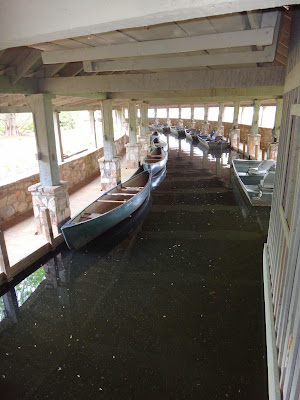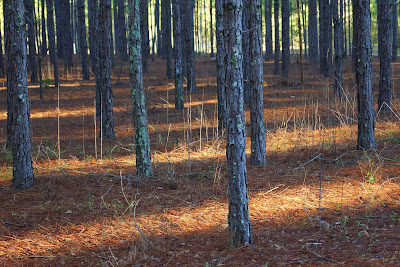Here you see the grand and gracious estate of Fuller E. Callaway. In 2004 his family's home was opened to the public, and that was only one of the many gifts that Mr. Callaway has given to the people in and around Lagrange, Georgia. I won't go into detail about that, but will just say the he was a philanthropist extraordinaire, and his legacy continues on in the community, in a big way.
Rick and I decided to visit on the recommendation of other full time RVers and authors of a blog I read: Living Our Dream. It was a perfect day for this visit, which took most of the afternoon. We had no idea how big it was! Despite the fact that I had read the blog about Hills & Dales, it was about a year ago, and I had forgotten the details. So when we pulled up to the visitors' center, we thought is was THE house. Silly us. Here I am snapping away before I realized it just was the visitors's center, which was nice, but nothing compared to the actual house. By the way, most of the pictures in this post were taken by Rick, including the marvelous one up top. I used up all my batteries at the visitors' center. : )
Inside there was an interesting collection of memorabilia from the three families who have lived on this property, and plenty of historical info. The woman who built the original garden was Sarah Ferrell. When she passed on, Fuller Callaway Sr. bought the property and in 1916 completed the home designed by architects Hentz & Reid, who were leading architects in the south at the time. Fuller's wife Ida rebuilt and expanded the gardens. When she passed away her son's family took over the estate, and her daughter-in-law Alice continued the work on the gardens. So in essence, three women designed, developed and loved this garden into its current state.
Following good orientation film at the visitors' center, our guide Sondra (below) took just the two of us on the tour, which started with a tram from the visitors' center to the home. She was so full of historical and local knowledge, and you could tell she just loved the place. By the end of the tour we felt almost as if we knew the Callaways and had been guests in their home.
There is no photography allowed in the house but other than that restriction, the estate is very welcoming. There are none of the typical ropes restricting access to the furnishings or any of the rooms on three floors. Although they ask that you don't touch or sit on anything, they let you roam anywhere you want. It all feels welcoming and homey, despite being a grand and beautifully furnished home.
This is the side entrance, where we went in. The design of the home is Italianate, which was all the rage at the time. The inside of the home has been left pretty much as it was when the last Callaways lived in it. When the house was built in 1916, Fuller Callaway wanted every convenience for his family, so it has everything available at the time, including a central vacuum system. Despite this, hundred year old plumbing and electricity needed to be upgraded before the house could be opened to the public. Here's another view of the entrance.
After our tour of the inside (about an hour) we were on our own for the gardens, which like the inside, were completely open and accessible to visitors. Below is the view of the house from what was once the pool. It has now been filled in for liability reasons. The estate is not fenced in, so local college students have been known to wander through after hours.
The garden had the same homey, welcoming feel that the house did. It is an old fashioned formal style garden, the plantings are deep and mature, and well shaded in many places by a wide variety of trees. This is a sweetly scented Chinese fringe tree.
Here's what is called the "Ray" garden, with beds extending out from the central gazebo.
Here's a view of the other end of the house, from the herb garden. The house is a long thin rectangle, with the wide side facing the main garden to maximize the views for those inside looking out. It does look very Italian here.
Arbor next to the herb garden:
There is a wonderful greenhouse, also completely open to visitors. It was one of my favorite places on the estate. We were really impressed with the orchids. By the way, the house is filled with flower arrangements straight from the garden. They've got a marvelous head gardener who supervises a team of eight (as I recall) others.
Another view of the inside of the greenhouse:
The iris garden outside the greenhouse:
The choices of flowers in the gardens are so tastefully coordinated in color and shape with the boxwoods and trees. Here is one of many shaded walkways through the gardens.
The garden is extensively terraced, as the house is situated on "hills and dales." The terraces are divided and subdivided by boxwood parterres, which means earth embroidery. Sarah Ferrell, the original gardener and visionary, laid out extensive designs inspired by Biblical themes and symbols.
This large maze-like parterre spells out GOD. Another smaller one nearby says GOD IS LOVE.
The exit from the garden is marked by this sweet bird gate.
Instead of taking the tram back we followed the naturally landscaped walkway down the hill, under tall magnolias, along a stream back to the visitors' center.
Visiting Hills & Dales is a delightful experience (they also have an unusually informative website). Although it is a small garden compared to nearby Callaway, its artistry, intimacy and charm make is a very special place. Similarly, the house is small compared to the Biltmore, but it is so much more homey. Rick and I think it's now one of our favorites, and would recommend it to anyone who loves beautiful scenery, gardens and homes.





















































